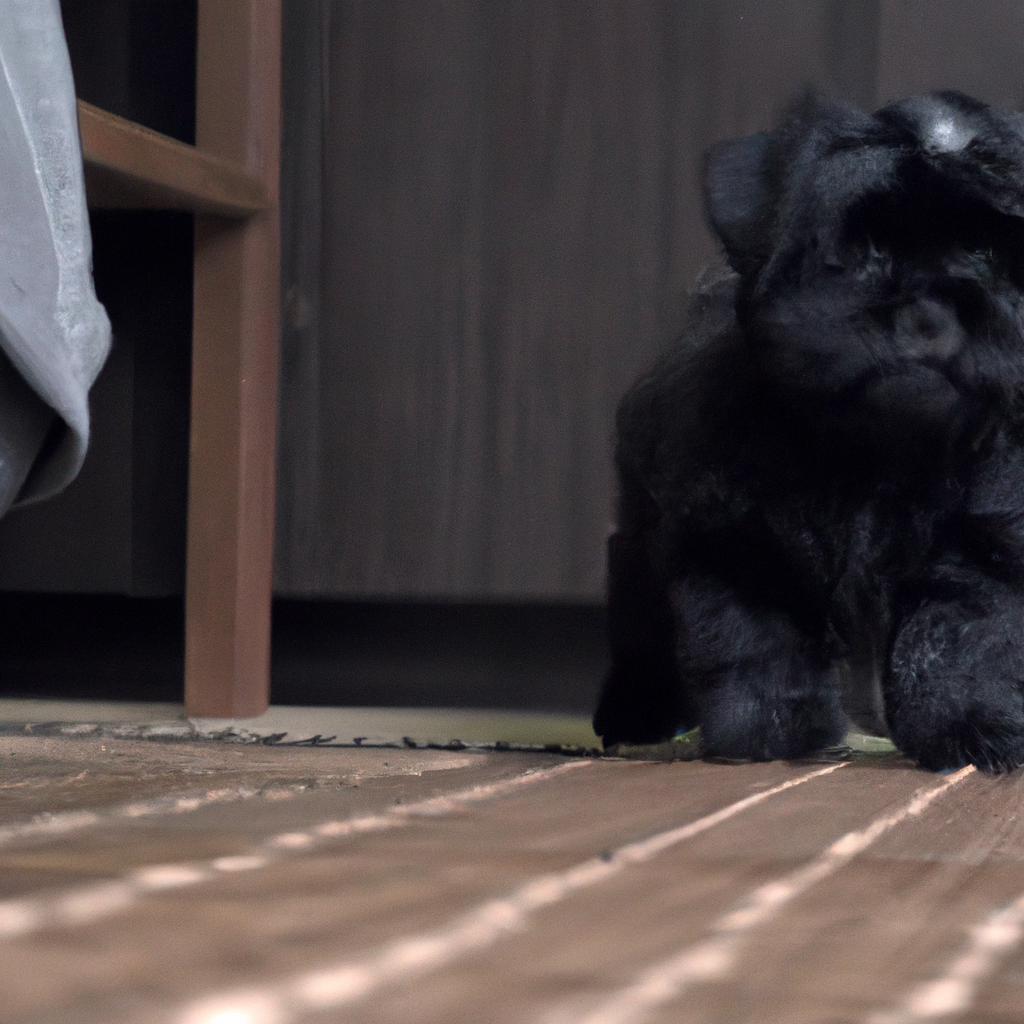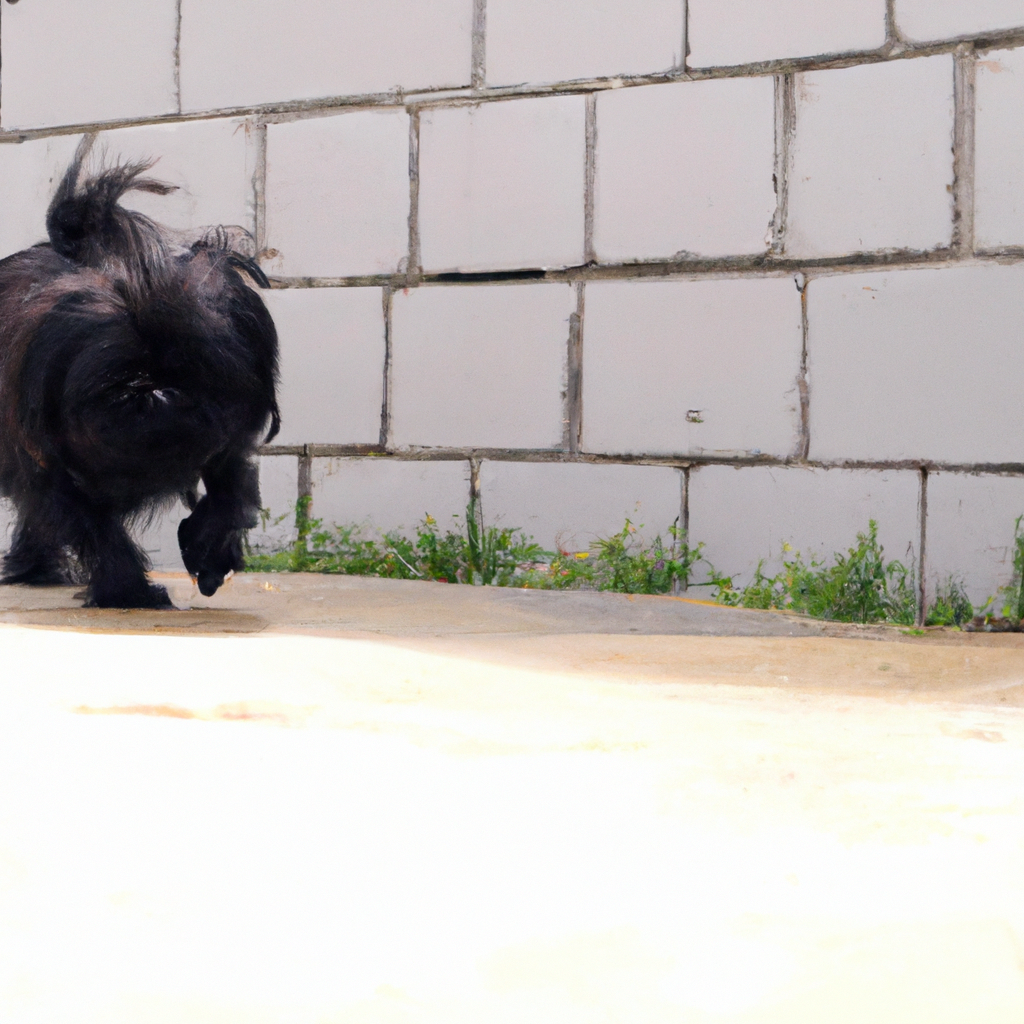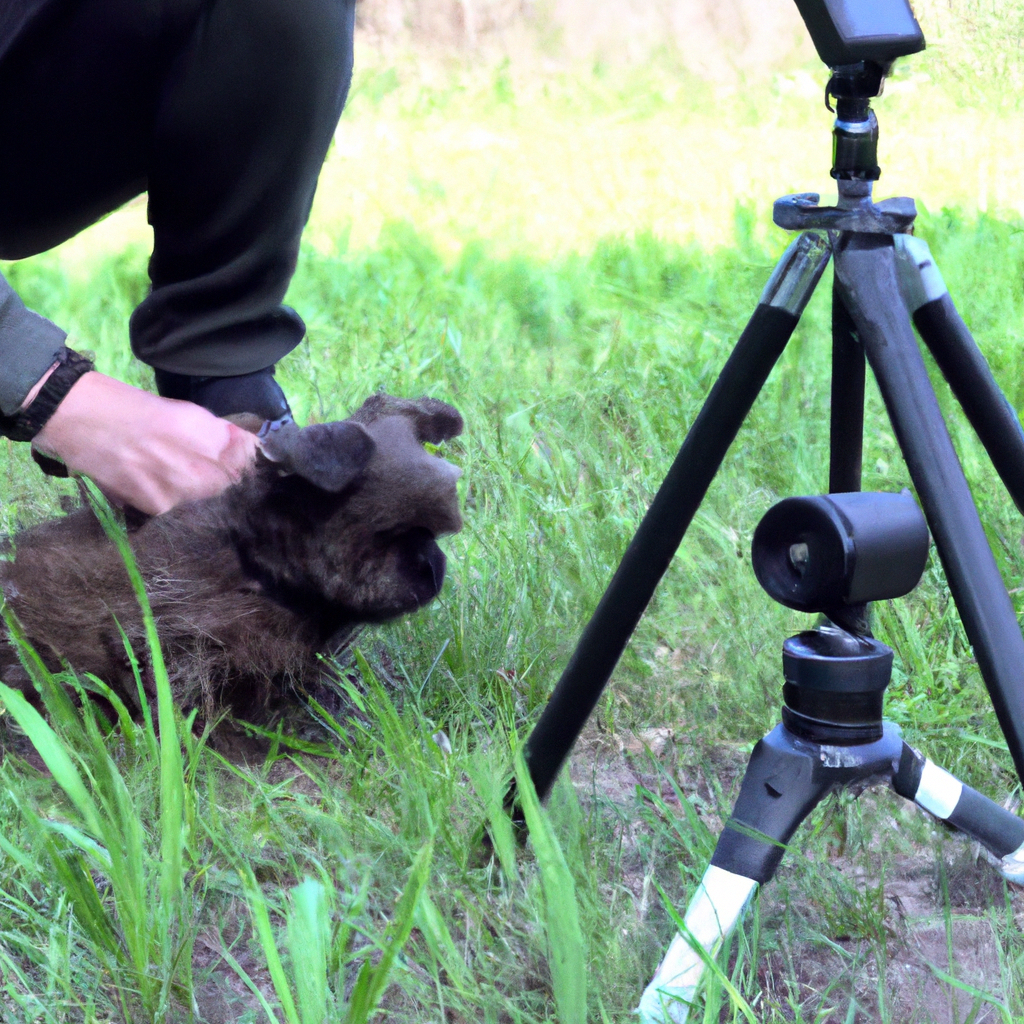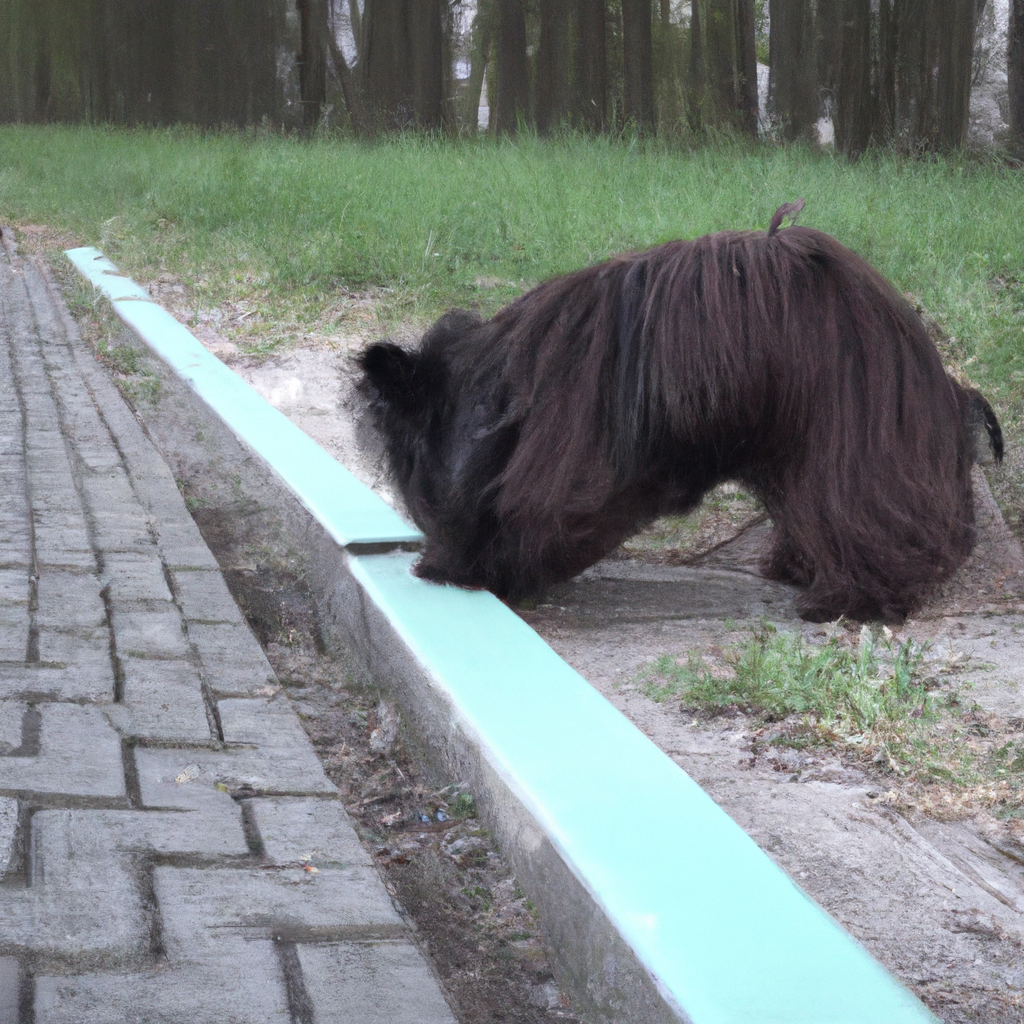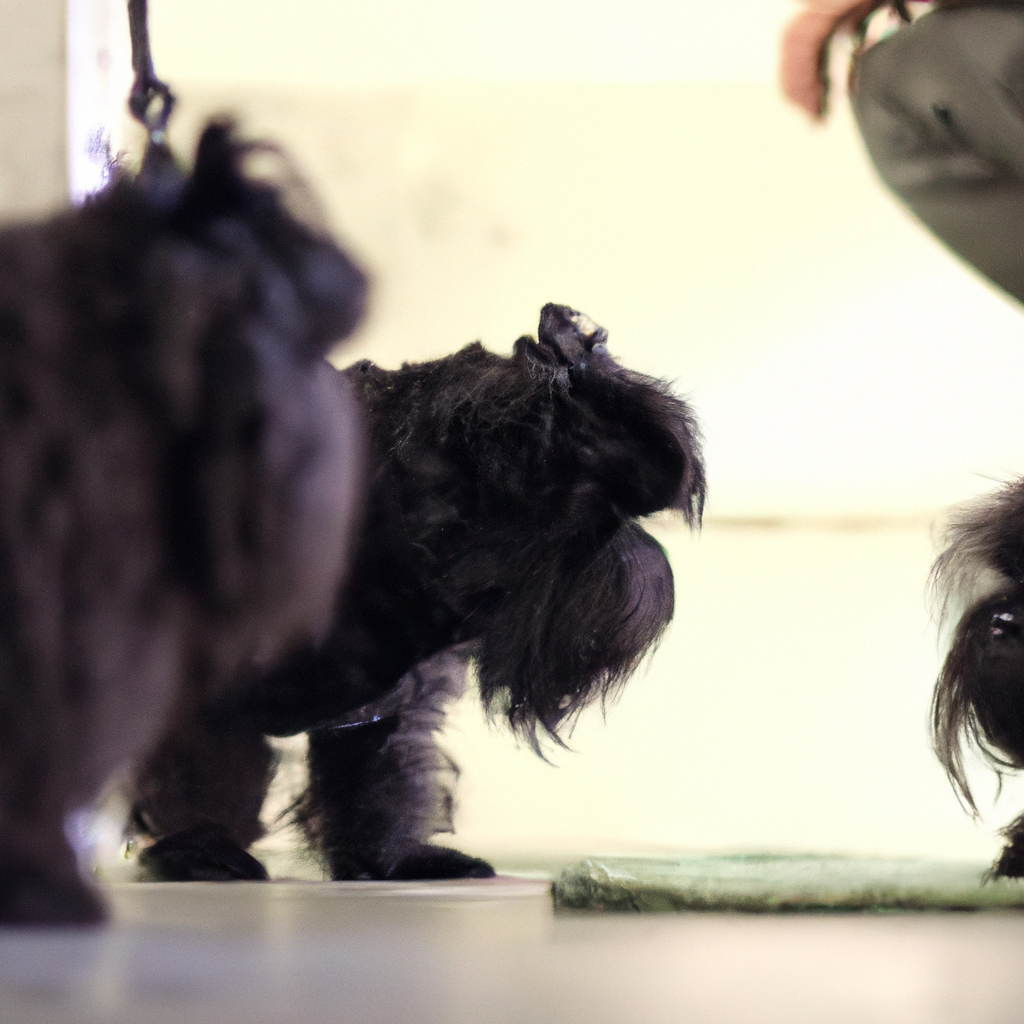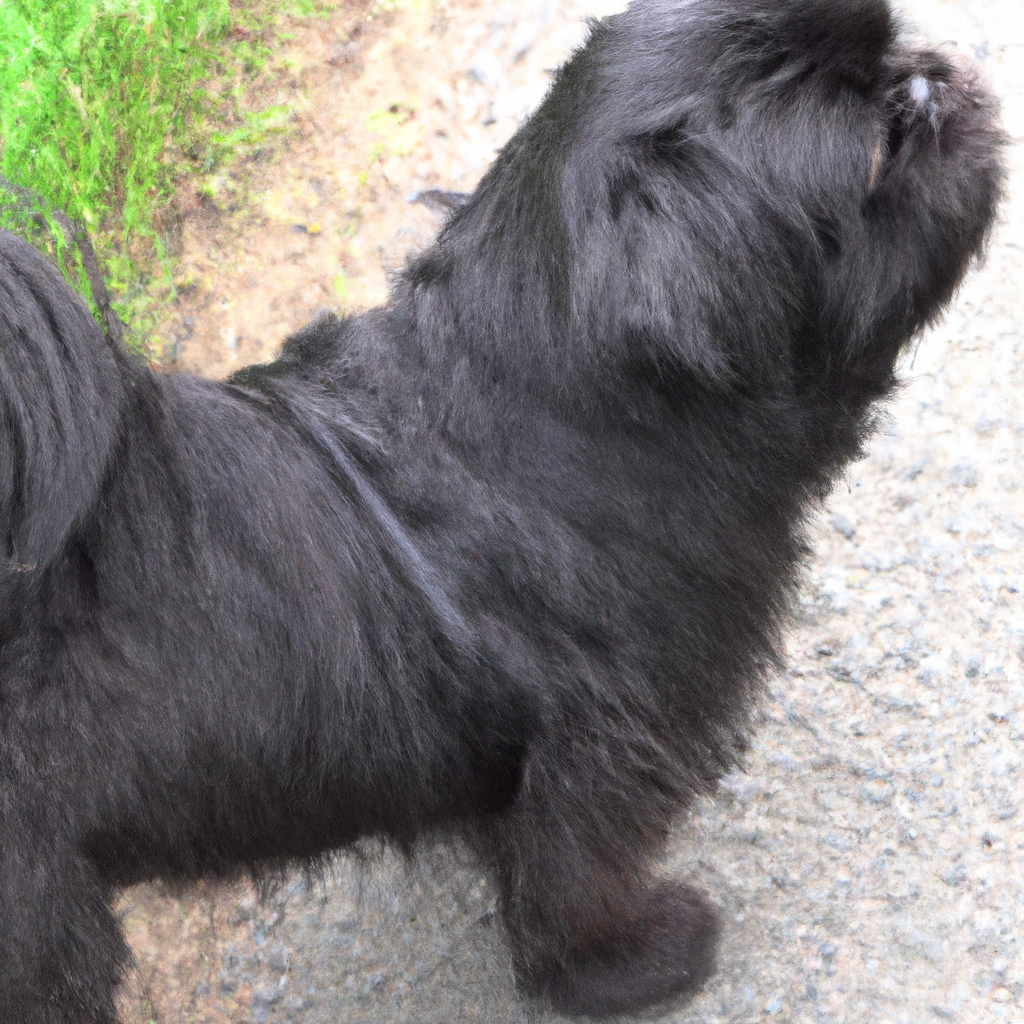Training an Affenpinscher puppy involves a series of steps and techniques aimed at instilling good behavior and obedience in this small, energetic breed. This guide will provide comprehensive information on how to effectively train an Affenpinscher puppy, covering aspects such as house training, socialization, basic commands, leash training, and dealing with potential behavioral issues. The goal is to help you establish a strong bond with your puppy and ensure it grows into a well-behaved and sociable adult dog.
Understanding the Affenpinscher: A Guide to Successful Training
The Affenpinscher, often referred to as the “Monkey Terrier” due to its primate-like appearance and playful nature, is a small but feisty breed. Training an Affenpinscher puppy can be a delightful experience, provided you understand the breed’s unique characteristics and apply the right training techniques.
Affenpinschers are known for their intelligence, curiosity, and stubbornness. These traits make them both entertaining and challenging to train. They are quick learners, but their stubborn streak can sometimes make them resistant to commands. Therefore, it’s crucial to approach training with patience and consistency.
Start training your Affenpinscher puppy as soon as you bring them home. Puppies are more receptive to learning new things, and early training helps in shaping their behavior. Housebreaking is usually the first step. Affenpinschers, like most small breeds, can be a bit difficult to house train. Consistency is key here. Establish a routine for meals and potty breaks and stick to it. Reward your puppy with praises or treats when they do their business in the designated area. This positive reinforcement encourages them to repeat the behavior.
Socialization is another important aspect of training. Affenpinschers are naturally wary of strangers and can be a bit territorial. Early socialization helps them become more comfortable around new people and environments. Introduce your puppy to different people, animals, and situations gradually. Remember, the goal is to make these experiences positive, so avoid forcing your puppy into situations that make them uncomfortable.
Affenpinschers are energetic and require regular exercise to keep them healthy and happy. Incorporate playtime into your training routine. This not only helps burn off their energy but also provides an opportunity for training. For instance, you can teach them to fetch, which also helps them learn the ‘come’ command.
Training an Affenpinscher puppy requires a balance of firmness and gentleness. They respond well to positive reinforcement techniques. Harsh punishment can make them fearful or aggressive, so it’s best to avoid it. Instead, use treats, praises, or toys to reward good behavior. If your puppy makes a mistake, a firm ‘no’ is usually enough to correct them.
Affenpinschers are known for their stubbornness, which can sometimes make training a bit challenging. If your puppy is being particularly stubborn, it’s important not to lose your patience. Instead, try to make training sessions more engaging. Use their favorite toys or treats to motivate them. Keep sessions short and fun to hold their interest.
Training an Affenpinscher puppy is not just about teaching them commands. It’s also about building a strong bond with your pet. Spend quality time with your puppy, show them love and affection, and they will be more inclined to please you.
In conclusion, training an Affenpinscher puppy requires understanding their unique characteristics and applying the right training techniques. With patience, consistency, and positive reinforcement, you can successfully train your Affenpinscher puppy and enjoy a rewarding relationship with your furry friend. Remember, every puppy is unique, so what works for one might not work for another. Be flexible in your approach, and don’t hesitate to seek professional help if needed. Happy training!
Effective Techniques for Housebreaking Your Affenpinscher Puppy
Training an Affenpinscher puppy can be a delightful experience, given their intelligent and playful nature. However, one of the most challenging aspects of raising a puppy is housebreaking. It’s a crucial part of their training, and it’s essential to approach it with patience and consistency. Here are some effective techniques to help you housebreak your Affenpinscher puppy.
Firstly, it’s important to establish a routine. Affenpinscher puppies, like all dogs, thrive on routine. They are more comfortable and secure when they know what to expect. Therefore, it’s beneficial to feed them, take them out for walks, and put them to bed at the same time every day. This routine will help them understand when it’s time to eat, play, and rest.
In addition to a daily routine, regular potty breaks are crucial. Puppies have small bladders and need to relieve themselves frequently. Generally, a puppy can hold its bladder for one hour for every month of its age. So, a three-month-old puppy will need a potty break every three hours. It’s also important to take them out first thing in the morning, after meals, and before bedtime.
When it comes to the actual potty training, positive reinforcement is key. When your Affenpinscher puppy does its business outside, shower them with praise and treats. This will help them associate going to the bathroom outside with positive experiences, making them more likely to repeat the behavior.
On the other hand, if your puppy has an accident inside, it’s crucial not to punish them. Puppies are still learning and don’t understand what they’ve done wrong. Instead, clean up the mess quietly and take them outside immediately. This will help them understand that outside is the place to go.
Another effective technique is crate training. Dogs naturally avoid soiling their sleeping areas, so a crate can be a useful tool for housebreaking. The crate should be large enough for your puppy to stand, turn around, and lie down, but not so large that they can use one corner as a bathroom. Remember, the crate should never be used as a punishment. It should be a safe and comfortable space for your puppy.
Lastly, patience is paramount. Housebreaking an Affenpinscher puppy, or any puppy for that matter, takes time. There will be accidents and setbacks, but it’s important to stay calm and consistent. Remember, your puppy is learning a new skill, and that takes time.
In conclusion, housebreaking your Affenpinscher puppy can be a rewarding experience. By establishing a routine, providing regular potty breaks, using positive reinforcement, avoiding punishment, utilizing crate training, and practicing patience, you can effectively housebreak your puppy. Remember, every puppy is unique and may require different training techniques. What’s most important is to create a loving and supportive environment for your puppy to learn and grow.
Socializing Your Affenpinscher: A Step-by-Step Guide
Training an Affenpinscher puppy is an exciting journey filled with rewarding moments and adorable mishaps. One of the most crucial aspects of this process is socialization. Socializing your Affenpinscher is not just about teaching them to play nicely with other dogs; it’s about helping them become well-rounded, confident, and happy dogs.
Start by introducing your Affenpinscher puppy to a variety of people, places, and situations. This can be as simple as taking them on walks in different neighborhoods, inviting friends over to meet them, or even just playing different types of music at home. The goal is to expose them to as many new experiences as possible, so they learn to feel comfortable in a variety of situations.
Remember, it’s not just about quantity, but also about quality. Make sure each new experience is positive for your puppy. For instance, if you’re introducing them to a new person, have that person give your puppy a treat or a toy. This way, your puppy will associate new people with positive experiences.
Next, let’s talk about other dogs. It’s important for your Affenpinscher to learn how to interact with dogs of all sizes and breeds. Dog parks can be a great place for this, but make sure your puppy is fully vaccinated before you start taking them there. Also, keep an eye on your puppy at all times to ensure they’re not getting overwhelmed or scared.
In addition to other dogs, your Affenpinscher should also be comfortable around other animals. If you have other pets at home, introduce them slowly and under controlled conditions. If you don’t have other pets, consider arranging playdates with friends or family members who do.
Now, let’s not forget about children. Children can be a bit unpredictable, which can be scary for a small puppy. Start by teaching any children in your home how to interact with your puppy in a gentle and respectful way. Then, gradually introduce your puppy to children outside of your home.
While socializing your Affenpinscher, it’s important to keep in mind that every dog is different. Some puppies may take to socialization like a duck to water, while others may need a little more time and patience. That’s perfectly okay. The key is to go at your puppy’s pace and never force them into a situation where they feel uncomfortable.
Lastly, remember that socialization is an ongoing process. Even after your Affenpinscher has grown into an adult, they should continue to have regular social experiences. This will help them maintain their social skills and prevent them from becoming anxious or fearful.
In conclusion, socializing your Affenpinscher is a vital part of their training. It’s about more than just teaching them to play nicely with others; it’s about helping them become the best dog they can be. So, take your time, be patient, and most importantly, have fun. After all, this is a special time in your puppy’s life, and it’s up to you to make it as enjoyable as possible.
Teaching Basic Commands to Your Affenpinscher Puppy
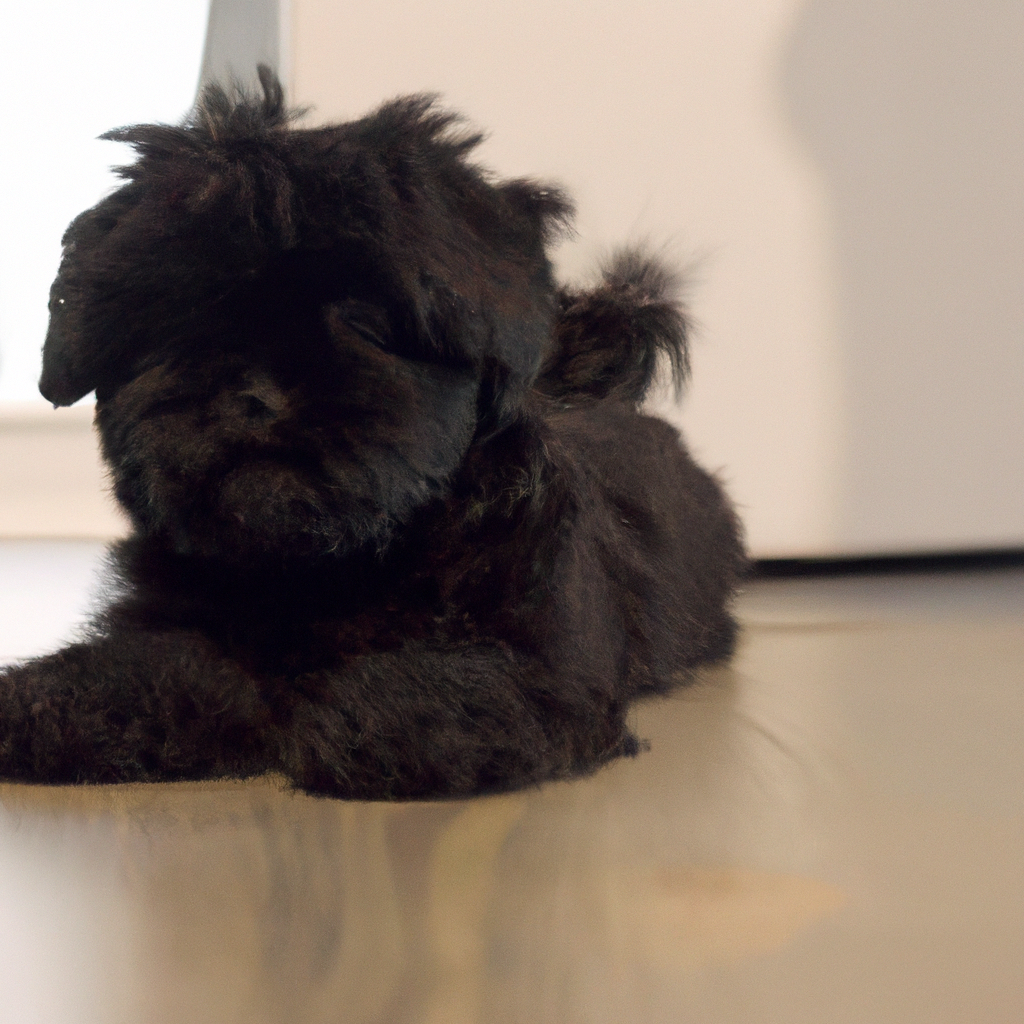
Training an Affenpinscher puppy can be a delightful experience, given their intelligent and playful nature. However, it requires patience, consistency, and a positive approach. This article will guide you through the process of teaching basic commands to your Affenpinscher puppy, ensuring a well-behaved and obedient companion.
Firstly, it’s important to understand that training should start as early as possible. Affenpinscher puppies are quick learners, and the sooner you start, the easier it will be for them to grasp the commands. Begin with simple commands like “sit,” “stay,” and “come.” These are the building blocks of obedience training and will pave the way for more complex commands later on.
To start with the “sit” command, hold a treat close to your puppy’s nose and slowly move it back over their head. As their head follows the treat, their bottom will naturally go down. Once they’re in the sitting position, say “sit,” give them the treat, and share affection. This positive reinforcement will make them associate the command with good things, encouraging them to repeat the behavior.
Next, let’s move on to the “stay” command. This command is crucial for their safety and can be a bit challenging for your energetic Affenpinscher puppy. Start by asking your puppy to “sit.” Then, open the palm of your hand in front of you and say “stay.” Take a few steps back and if they stay, reward them with a treat and affection. Gradually increase the distance. If your puppy doesn’t stay, don’t punish them. Instead, patiently repeat the process.
The “come” command is another essential command that can keep your puppy out of trouble and bring them back to you in potentially dangerous situations. To teach this, put a leash and collar on your puppy. Go down to their level and say “come” while gently pulling on the leash. When they come to you, reward them with a treat and affection. Over time, you can practice this command without the leash.
Remember, Affenpinscher puppies, like all puppies, have short attention spans. Keep your training sessions short and fun. Aim for 5 to 10 minutes at a time, and gradually increase as they grow older. Also, consistency is key. Practice these commands every day and use them in your daily interactions with your puppy.
Moreover, always use positive reinforcement. Affenpinschers respond well to rewards, whether it’s treats, toys, praises, or cuddles. Avoid harsh punishments as they can lead to fear and anxiety, hindering the training process.
Lastly, socialization is an important part of your Affenpinscher puppy’s training. Expose them to different environments, people, and other animals. This will help them become well-rounded, confident dogs.
In conclusion, training an Affenpinscher puppy requires patience, consistency, and positivity. Start with basic commands like “sit,” “stay,” and “come,” and gradually move on to more complex ones. Keep your training sessions short and fun, and always reward your puppy for their good behavior. With time and effort, your Affenpinscher puppy will grow into a well-behaved and obedient companion.
How to Train an Affenpinscher Puppy: Dealing with Behavioral Issues
Training an Affenpinscher puppy can be a delightful experience, but it’s not without its challenges. These small, energetic dogs are known for their playful and sometimes stubborn nature, which can make training a bit of a task. However, with patience, consistency, and a good understanding of their behavior, you can effectively train your Affenpinscher puppy and deal with any behavioral issues that may arise.
Affenpinschers are intelligent dogs, but they also have a strong independent streak. This means that while they’re capable of learning quickly, they may also decide to do things their own way. Therefore, it’s important to start training as early as possible. Puppies are more receptive to learning new behaviors and breaking bad habits. So, the sooner you start, the better.
One of the most common behavioral issues with Affenpinscher puppies is their tendency to be a bit nippy. This is a natural behavior for them, as they were originally bred to hunt rats and other small vermin. However, it’s not a behavior that’s acceptable in a household pet. To curb this behavior, it’s important to redirect their energy towards appropriate outlets, like chew toys. If your puppy starts to nip, simply say “no” in a firm but gentle voice, and then give them a toy to chew on. This will help them understand what is and isn’t acceptable behavior.
Another issue that you may encounter with your Affenpinscher puppy is stubbornness. These dogs are known for their strong will, which can sometimes make training a bit of a challenge. However, this doesn’t mean that they’re impossible to train. It just means that you’ll need to be patient and consistent. If your puppy doesn’t seem to be catching on to a certain command or behavior, don’t give up. Keep practicing, and eventually, they’ll get the hang of it.
Affenpinschers are also known for their high energy levels. This can sometimes lead to destructive behavior if they don’t have an appropriate outlet for their energy. Regular exercise is crucial for these dogs. A good walk or play session can help tire them out and reduce the likelihood of them getting into trouble. Additionally, mental stimulation is just as important as physical exercise. Puzzle toys, training sessions, and interactive games can help keep their minds sharp and prevent boredom.
Lastly, socialization is key when it comes to training an Affenpinscher puppy. These dogs can be a bit wary of strangers and other dogs, so it’s important to expose them to a variety of people, places, and situations from a young age. This will help them become well-rounded, confident dogs.
In conclusion, training an Affenpinscher puppy requires patience, consistency, and a good understanding of their behavior. While they can be a bit stubborn and energetic, these traits can also make them fun and engaging pets. With the right approach, you can effectively deal with any behavioral issues and enjoy a rewarding relationship with your Affenpinscher puppy.
The Role of Positive Reinforcement in Affenpinscher Training
Training an Affenpinscher puppy can be a delightful experience, especially when you understand the role of positive reinforcement in the process. Affenpinschers, also known as “Monkey Terriers,” are small, intelligent, and energetic dogs that respond well to positive reinforcement training methods.
Positive reinforcement is a training method that involves rewarding your puppy for good behavior. This reward can be a treat, a toy, or even just a lot of praise and petting. The idea is to make the puppy associate good behavior with positive experiences, encouraging them to repeat the behavior in the future.
When training an Affenpinscher puppy, it’s important to remember that they are a breed with a strong personality. They are known for their stubbornness and independence, which can sometimes make training a bit challenging. However, with patience, consistency, and a lot of positive reinforcement, you can successfully train your Affenpinscher puppy to be a well-behaved and obedient companion.
Start by identifying the behaviors you want to encourage in your puppy. This could be anything from sitting on command to not jumping up on guests. Once you’ve identified these behaviors, you can start to reward your puppy whenever they exhibit them. For example, if you’re trying to teach your puppy to sit, you could give them a treat every time they do it on their own. Over time, your puppy will start to associate sitting with getting a treat and will be more likely to do it on command.
It’s also important to remember that timing is crucial in positive reinforcement training. You need to reward your puppy immediately after they exhibit the desired behavior. If you wait too long, your puppy might not make the connection between the behavior and the reward.
Another key aspect of positive reinforcement training is consistency. You need to be consistent with your rewards and your commands. If you reward your puppy for a behavior one day and then ignore it the next, your puppy will get confused and won’t know what you want from them. Similarly, if you use different commands for the same behavior, your puppy won’t understand what you’re asking them to do.
While training an Affenpinscher puppy using positive reinforcement can be a bit challenging due to their independent nature, it’s also incredibly rewarding. Seeing your puppy learn and grow is a wonderful experience, and knowing that you’re using a method that’s kind and respectful to your puppy makes it even better.
Remember, training a puppy is a process, and it takes time. Don’t get discouraged if your puppy doesn’t catch on right away. Keep at it, stay consistent, and always reward good behavior. With time, patience, and a lot of positive reinforcement, your Affenpinscher puppy will become a well-behaved and obedient companion.
In conclusion, positive reinforcement plays a crucial role in training an Affenpinscher puppy. It’s a method that respects your puppy’s intelligence and independence while also encouraging good behavior. So, if you’re bringing an Affenpinscher puppy into your home, remember to arm yourself with a lot of patience, consistency, and positive reinforcement. Happy training!
Affenpinscher Puppy Training: Tips for Preventing Aggression
Training an Affenpinscher puppy can be a delightful experience, given their playful and adventurous nature. However, like any other breed, Affenpinschers can develop aggressive tendencies if not properly trained from a young age. Therefore, it’s crucial to understand how to prevent aggression in your Affenpinscher puppy to ensure they grow into a well-behaved and sociable adult dog.
Firstly, it’s important to understand that Affenpinscher puppies are naturally curious and energetic. They love to explore their surroundings and play with their owners. However, this curiosity can sometimes lead to aggressive behavior if they feel threatened or scared. Therefore, it’s essential to provide a safe and comfortable environment for your puppy. This includes providing them with plenty of toys to keep them entertained, as well as a comfortable bed to rest in.
Socialization is another key aspect of preventing aggression in Affenpinscher puppies. This involves exposing your puppy to a variety of people, animals, and environments to help them become comfortable with different situations. The more your puppy is exposed to, the less likely they are to react aggressively out of fear or uncertainty. Start by introducing your puppy to family members and friends, then gradually expose them to other animals and environments. Remember to always supervise these interactions to ensure they remain positive and safe.
Training your Affenpinscher puppy to follow basic commands is also crucial in preventing aggression. Commands such as “sit”, “stay”, and “leave it” can help you control your puppy’s behavior and prevent them from acting out. Training should be consistent and positive, using rewards such as treats or praise to reinforce good behavior. Avoid using punishment as a training method, as this can lead to fear and aggression.
In addition to training, it’s also important to establish clear boundaries with your Affenpinscher puppy. This means setting rules about where they can go, what they can chew on, and how they should behave. Consistency is key here – if you allow your puppy to break the rules occasionally, they will become confused and may start to display aggressive behavior.
Lastly, it’s important to remember that preventing aggression in Affenpinscher puppies requires patience and understanding. Your puppy is learning about the world and will make mistakes along the way. It’s your job as their owner to guide them and help them learn in a positive and supportive way. If you’re struggling with training, don’t hesitate to seek help from a professional dog trainer or behaviorist.
In conclusion, training an Affenpinscher puppy to prevent aggression involves providing a safe environment, socializing them, teaching them basic commands, establishing clear boundaries, and being patient and understanding. With these tips in mind, you can help your Affenpinscher puppy grow into a well-behaved and sociable adult dog. Remember, every puppy is unique and may require different training methods. Always be patient and consistent, and don’t hesitate to seek professional help if needed.
Crate Training Your Affenpinscher: A Comprehensive Guide
Training an Affenpinscher puppy can be a delightful experience, given their playful and adventurous nature. However, it can also be a bit challenging, especially when it comes to crate training. But don’t worry, with patience, consistency, and a comprehensive guide, you can successfully crate train your Affenpinscher puppy.
Firstly, it’s important to understand why crate training is essential. Crate training is not about confining your puppy, but rather about creating a safe, comfortable space for them. It helps in house training, as dogs naturally avoid soiling their sleeping areas. It also provides a secure place for your puppy when you can’t supervise them, preventing them from getting into mischief.
Now, let’s dive into the process. Start by choosing the right crate. It should be large enough for your puppy to stand, turn around, and lie down comfortably, but not so large that they can use one corner as a bathroom. If your puppy is still growing, consider a crate with a divider that can be adjusted as your puppy grows.
Next, introduce your puppy to the crate. Place it in a common area where your family spends a lot of time. Make the crate inviting by adding a soft blanket and a few toys. Encourage your puppy to explore the crate on their own, but don’t force them. You can entice them by placing treats or their favorite toys inside the crate.
Once your puppy is comfortable entering the crate, you can start feeding them their meals inside. This will create a positive association with the crate. After a few days, try closing the door while they eat and then opening it as soon as they’re done. Gradually increase the time the door stays closed after they finish eating.
The next step is to start leaving your puppy in the crate for short periods while you’re home. Use a command like “crate” or “bed,” give them a treat, and then close the door. Stay nearby at first, gradually increasing the distance between you and the crate over time.
Now, it’s time to leave your puppy in the crate while you’re away from home. Start with short absences and gradually increase the length of time you’re gone. Always ensure your puppy has had a chance to relieve themselves before being crated to avoid accidents.
Remember, crate training is a gradual process that requires patience. Never use the crate as a punishment, as this will create a negative association. Instead, make the crate a positive and safe place for your puppy.
Nighttime crate training can be a bit tricky with a young Affenpinscher puppy. They may cry or whine at first. It’s important to resist the urge to let them out, as this will teach them that crying leads to being let out. However, young puppies may need to go out to relieve themselves during the night, so it’s essential to distinguish between crying for attention and crying to go out.
In conclusion, crate training your Affenpinscher puppy can be a rewarding process that results in a well-adjusted, happy dog. It requires patience, consistency, and a positive approach. With these tips in mind, you’re well on your way to successfully crate training your Affenpinscher puppy.In conclusion, training an Affenpinscher puppy requires patience, consistency, and positive reinforcement. It’s important to start with basic commands like “sit”, “stay”, and “come” and gradually move on to more complex ones. Socialization from a young age is crucial to ensure they get along well with other animals and people. Crate training can help with housebreaking, while leash training is necessary for safe walks. Regular exercise and mental stimulation are also key to prevent destructive behaviors. Remember, every puppy is unique, so it’s important to adapt your training methods to your Affenpinscher’s individual needs and personality.
